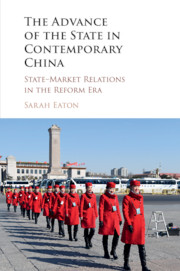Book contents
- Frontmatter
- Dedication
- Contents
- List of figures
- List of tables
- Preface
- Acknowledgements
- 1 The advance of the state in China: the power of ideas
- 2 The ideas behind the advance of the state
- 3 The state's advance in the air: an analysis of airline reform
- 4 Advance of the state in telecommunications: the bricolage of managed competition
- 5 Is the state's advance coming to a halt?
- Bibliography
- Index
Preface
Published online by Cambridge University Press: 05 December 2015
- Frontmatter
- Dedication
- Contents
- List of figures
- List of tables
- Preface
- Acknowledgements
- 1 The advance of the state in China: the power of ideas
- 2 The ideas behind the advance of the state
- 3 The state's advance in the air: an analysis of airline reform
- 4 Advance of the state in telecommunications: the bricolage of managed competition
- 5 Is the state's advance coming to a halt?
- Bibliography
- Index
Summary
It is not every day that one hears a senior American policymaker admit that ideology has tainted his or her policy choices. In American political discourse, the word ‘ideology’ is typically reserved to describe the false beliefs held by the opposing team. One's own views do not sit on such unsteady foundations but rather stand firmly on the ground of Truth.
It was surreal, then, to see Alan Greenspan, Chair of the Federal Reserve from 1987 to 2006 – the man once known as ‘The Oracle’ to financiers – own up to an ‘ideology’ that he admitted had contributed to the Global Financial Crisis of 2008. In a congressional hearing during the darkest days of the crisis, Greenspan admitted he was in a ‘shocked state of disbelief’ because of the ‘collapse’ of an ‘intellectual edifice’ of risk management models (US Congress 2008: 13). Greenspan's mea culpa, however, did not satisfy the committee's chair, Democrat Henry Waxman, who pushed Greenspan to make a broader denunciation of his beliefs. He began by quoting Greenspan as having said ‘I do have an ideology. My judgment is that free, competitive markets are by far the unrivaled way to organize economies. We have tried regulation, none meaningfully worked.’ Waxman then asked whether Greenspan felt that his ideology had driven him ‘to make decisions that you wish you had not made?’ Greenspan replied that ‘Yes, I found a flaw, I don't know how significant or permanent it is, but I have been very distressed by that fact’ (ibid. 46).
This and other scenes in the dark days of the Global Financial Crisis pulled back the curtain on Anglo-American capitalism. Long held up by champions of the Washington Consensus as the endpoint of history, the crisis revealed that the intellectual edifice of financial capitalism in the twenty-first century is, like the shoddy ‘tofu buildings’ (doufu lou 豆腐楼) that litter China's urban landscapes, shaky to the core. It was an ungentle reminder of John Maynard Keynes’ famous insight about the immense power of ideas ‘for good or evil’, gleaned in the blackness of the Great Depression (Keynes [1936] 1997: 384).
- Type
- Chapter
- Information
- The Advance of the State in Contemporary ChinaState-Market Relations in the Reform Era, pp. xi - xvPublisher: Cambridge University PressPrint publication year: 2015



